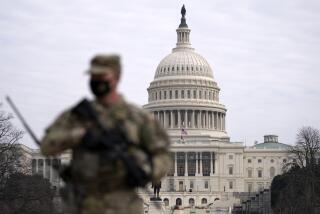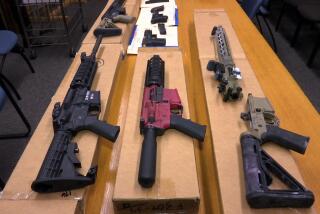Congress Passes Bill to Ban Weapons Made of Plastic
- Share via
WASHINGTON — The House, moving to control the threat of terrorist weapons that have yet to be developed, gave final approval Thursday to legislation controlling the manufacture, sale and use of all-plastic weapons that could elude metal detectors in airports and public buildings.
The bill, which was approved on a voice vote, was passed earlier by the Senate. It now goes to President Reagan, who is expected to sign it into law. The measure is supported by a broad coalition of law enforcement officials and has not been opposed by the powerful National Rifle Assn.
During a brief debate, sponsors conceded that no all-plastic handguns are known to exist, but they predicted that rapidly developing technology could make such weapons highly likely in the next few years. Without swift federal action to control such weapons, they added, terrorists and other dissidents could play havoc with the nation’s security.
“If such a weapon was ever taken onto an airliner or into a public building without detection, it could result in the loss of many lives,” Rep. Bill McCollum (R-Fla.) said. “We pray that this may never come to pass, but we cannot take anything for granted.”
Rep. William J. Hughes (D-N.J.), who chairs the crime subcommittee of the House Judiciary Committee, added that the bill “is especially important to those of us in public service, who work in public buildings. This legislation will protect us and others against such weapons.”
Earlier this year, it was questionable whether such legislation would ever be approved. When an earlier version of the bill was proposed, for example, it drew strong opposition from the politically influential NRA, which adamantly opposes the prohibition of firearms.
At first, then-Atty. Gen. Edwin Meese III appeared to be siding with the NRA, but he ultimately agreed to seek a compromise on the issue under pressure from a broad coalition of law enforcement officials, who favor a strong ban on such weapons.
Under the final version of the bill, the government would prohibit the manufacture, importation, sale, shipment, delivery or possession of any firearms that could elude detection by a walk-through metal detector. Currently, metal detectors are calibrated to spot weapons containing at least 3.7 ounces of stainless steel. Guns would have to be detectable even after their grips, stocks or magazines had been removed.
In addition, the legislation regulates any “major component” of a weapon that, when screened by detection devices, fails to generate an image that depicts it shape.
Violation of the law would be a felony, punishable by a fine of up to $250,000 for individuals and $1 million for any organization and up to five years in jail.
Law enforcement and gun control advocates, who have been backing such legislation for many years, called its passage a great boost for crime-fighting efforts.
“This is a tremendous victory for law enforcement and all those citizens who want to keep handguns out of the wrong hands,” said Charles Orasin, president of Handgun Control, a nationwide lobbying group.
“The NRA fought this legislation, but then they threw in the towel when they realized that not only law enforcement but Congress and the Administration supported this bill,” he said. “It shows a growing recognition in Congress that something must be done about these issues.”
However, sponsors agreed to some key concessions as a condition of passage.
First, the regulations would not restrict any firearms that exist before passage of the bill. Second, the bill would permit the manufacture of plastic weapons prototypes for testing purposes by military and intelligence agencies, as well as local governments.
Finally, the legislation recognizes that swift advances in weapons detection technology may make such controls obsolete. As a result, the Treasury Department would be authorized to send periodic recommendations to Congress permitting the manufacture of such plastic weapons provided they are detectable by conventional metal detectors. The bill would expire within 10 years of passage.
Some House members who strongly support the NRA have said that these exemptions are necessary because of a prevailing “hysteria,” a belief that plastic guns are now widely available. They stressed that such firearms should not be viewed exclusively as terrorist-type weapons.
More to Read
Sign up for Essential California
The most important California stories and recommendations in your inbox every morning.
You may occasionally receive promotional content from the Los Angeles Times.













